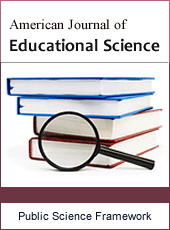American Journal of Educational Science
Articles Information
American Journal of Educational Science, Vol.3, No.2, Mar. 2017, Pub. Date: Dec. 13, 2017
The Role of HAfsids Dynasty in Development of Education and Its Educational Institute in Ifriqyah
Pages: 13-18 Views: 3453 Downloads: 1523
[01]
Mohammadreza Shahidipak, Department of Humanity, Literature and Arts, History, Islamic Azad University Central Tehran Branch, Tehran, Iran.
One of the major symbols of the human’s civilization is issue of the policy and leadership of education. Civilizational foundations of the education are some of the human’s establishments which have been created after urbanization developing and human society evolution. Islamic civilization is one of the communities that have established different educational systems and instructions among its nations and determined policy of education in medieval. Ruling by leadership of education is educational phenomenon of world history of education studied by any scholars and orientalists. There is In Medieval Europe, appearance of the universal stream of education along with Islam appearance. Islam has developed the policy of education in different dimensions and structures and created new texts, methods, management the scientific life of master and student, educational institutions and civilizational establishments for education. paper express an extensive and perfect example of the Islamic education in which textbooks, training methods and institutions have been mentioned and a portrait of a period of the Islamic education have been drawn. This era of the history of Islamic education that was established by Hafsids dynasty in Ifriqiyyah successors of Al-Mohads Empire has an especial position in the history and Leadership of education in medieval and early of renaissance Because it has an essential role in transforming science to Europe and establishing first educational institutions especially in Italy near borders of educational city of Tunisia, capital of Hafsids that it was leadership of education From the early of 1229 to 1574, and by leadership of education it succeed to continue the final period of classic civilization of Islam. Hafsids government first was ruled out all over Morocco and a small part of Andalusia but about of 1250 their territory was limited to Tunisia and eastern Algeria. The most popular and various kinds of training institutions were established during this period. Ibn Khaldon, Montesquieu of Arab and reviewer of Islamic education system who considered textbooks critical, graduated from this system. He analyzed fall of Islamic civilization in Andalusia and its flourish in Ifriqyah, by migration and transferring of Islamic policy of education from Andalusia to Ifriqyah, determined and proved the close relation between development and education.
Education, Hafsids, Ibn-Khaldun, Tunisia, Policy
[01]
Abu'l-Faraj Muhammad bin Is'hāq al-Nadim – Fahrest, javidan publisher, Tehran, 1347-1965.
[02]
Abdolvahab, Hassan, varaghat in Arabic civilization of Ifriquyah, tunesia, 1972.
[03]
Abdolvahab, Hassan, Al- omr, byrut, 1990.
[04]
Al – Aravi, abdolah, brif history of Maghreb, Mojmal tarikh of Maghreb, byrut, 1994.
[05]
Durant - will, the history of civilization, translated by translators group, scientific and culture publisher, Tehran, 1999.
[06]
Jolyayan, Andery, Sharl, history of north Africa, translated by Mazali, Al – Dar Al tunesia for publishing, 1985.
[07]
Jayyusi, Islamic heritage of Spain, translated by razavi translation gro, Razavi publisher, Tehran, 2002.
[08]
Ghabrinee, Ahmad, onvan –Al –derayah, Byrut, 1969.
[09]
-Gutek, Gerald, philosophical and ideological perspective on education, 1997, translated by pakseresht, samt publisher, Tehran, 2006.
[10]
Ghonaymah, abdol Rahym, History of Islamic university, translated by prof. Kassaye, Tehran, 1983.
[11]
Hunke, sigrid, Islamic culture in Europe, translated by Rahbani, nasher Islamic culture publisher, Tehran, 1997.
[12]
Ibn- Khaldun, The Mu QADDIMAH, translated from the Arabic by Frantez Rosental, Bollingen foundation Inc, New york, 1958, v, 2.
[13]
Mamud, Taher, Zytunah university, Tehran, 2000.
[14]
Miquel Andre, Islam and Islamic civilization, translated by forughi Hassan, Samt publisher, Tehran, 2003.
[15]
Mosahib, gholamhossian, Encyclopadia, 2003.
[16]
Mooen, encyclopedia of prsian word, Tehran Amir kabir publisher, 2003.
[17]
OG-Bern, back ground of sociology, translated by Aryanpur, Tehran, 2010.
[18]
Sarton, Gorge, introduction to the history of science, translated by Afshar, scientific and culture publisher, Tehran, 2005.
[19]
Shahidipak Mohammadreza, History of Islamic science and civilization and culture in Hafsids dynasty in Ifriquyah in medieval, alavion publisher, Tehran, 2016.
[20]
Shahidipak, Mohammadreza, history of Islamic education and civilization in Hafsids period in IfriQyah in medieval. Alavion publisher, Qom, 2016.
[21]
Shahidipak, Mohammadreza, Analytic history of Andalusia, Tehran, 2011.
[22]
Shahidipak, Mohammadreza, Analytic history of Maghreb, Tehran, 2011.
[23]
Shahidipak, Mohammadreza, The Varity and typology of structure of various Kinds of Islamic education in Hafsids period (Libya – Algeria- Tunisia), Alavion publisher. Qom, 2017.
[24]
Shahidipak, Mohammadreza, Encyclopedia of Persian literature, Ibn Hajeb, v, 1, 2005.
[25]
Shahidipak, Mohammadreza, the conflict between Democracy, Tradition and the shape of city from Aristotle to Rawls, 23 -25 October 2014, turkey Bursa.
[26]
Shahidipak, Mohammadreza, history of Tunisian medicine, Qom, 2006.
[27]
Shahidipak, Mohammadreza, City, Justice in a Greek Discourse and Ibn- Khaldun Discourse” IV. INTERNATIONAL PHILOSOPHY CONGRESS Poverty, Solidarity and Justice» ULUDAG UNIVERSITY 13-15 OCTOBER, BURSA-TURKEY, 2016.
[28]
Sovisi, the cases of Arabic scientific heritage, DarAl-Gharb publisher, Byrut, 2001.
[29]
Toynbee, the story of civilization, 1990.
[30]
Zaydan, Gorji, Islamic civilization and culture, translated by Javaher kalam, Tehran, 1994.
[31]
Zarinkoob, hossin, Karnameh of Islam, Amir Kabir publisher, Tehran, 2004.

ISSN Print: 2381-7127
ISSN Online: 2381-7135
Current Issue:
Vol. 6, Issue 2, June Submit a Manuscript Join Editorial Board Join Reviewer Team
ISSN Online: 2381-7135
Current Issue:
Vol. 6, Issue 2, June Submit a Manuscript Join Editorial Board Join Reviewer Team
| About This Journal |
| All Issues |
| Open Access |
| Indexing |
| Payment Information |
| Author Guidelines |
| Review Process |
| Publication Ethics |
| Editorial Board |
| Peer Reviewers |


